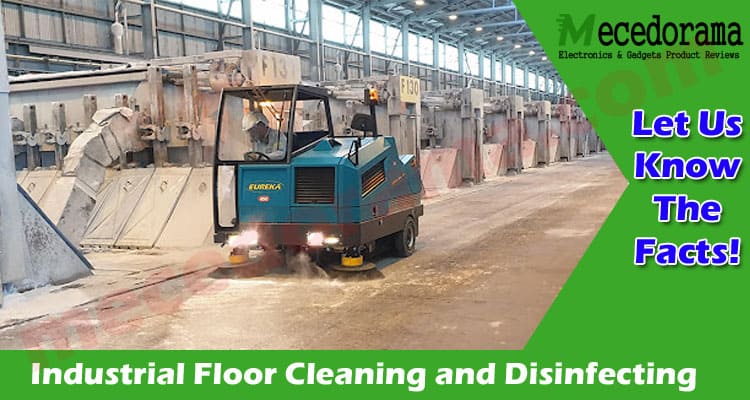Industrial Floor Cleaning and Disinfecting: If you have landed on this article, it is safe to assume that you operate in an industrial space and are looking at ways to make sure the floor area remains scot-free.
Hygiene is essential at workplaces to ensure the well-being of all the workers and the produce. This much is common knowledge, but, what is not known to most is how to maintain the sanctity of the floor. It is prone to spills and contamination!
Moreover, the number of workers in the room is bound to get dirty with the footfall. The only practical thing we can do is clean up. But, how?
Ways to clean and disinfect your industrial floor:
But, first, we must understand the difference between the two.
Cleaning is the process of removing impurities from a surface. This could already be pre-required for disinfecting, too; you would have to remove the harmful microbes on the surface; however, cleaning is only boosted when you go for all-combining disinfection. When you remove the maximum possible contaminants from a surface, you disinfect it.
Now, to put it simply, here’s the difference between cleaning and disinfecting: You can clean a floor using a mop and a bucket; however, to completely disinfect it, you would need chemical assistance. Only cleaning would lead to vulnerability to contamination, but only disinfection would leave behind a greasy and non-finished ground. This is why it’s essential that your industrial cleaning equipment does more than just clean. It should also disinfect.
How you cleanse and do the disinfection ritual broadly depends on:
- The nature of the spill: If you are only smearing the dust off the ground, a bucket of warm water and a fibre-based mop is enough. If you are wiping liquid spills off, you would need over-moulded squeegees, which clean and dry the surface they get used on. Keep in mind the water solubility quotient of the contents in that spill also matters.
- The industry: A pharmaceutical aggregator would not clean the way a food processing warehouse would, and that can be said for all industry types. Industries like automakers and electronics have huge solid waste, and so they need specialized industrial vacuum cleaners. Pharma companies have stringent cleaning norms down to measuring air contamination as well. If you work in a restaurant and you spilled oil and sugar, you could use an alkali-based solution to clean up the mess. However, in the case of chemical spills, agents with extreme oxidizing powers have to be used.
- The material using which the floor is made: You could scrub a standard tile or concrete floor. However, scrubs and abrasives when used on epoxy floors lead to scratches and poor maintenance.
Once you have made a note of these aforementioned factors, you can start narrowing down your hunt for the right industrial cleaning equipment.
A floor scrubber and sweeper could make the process much easier. It would not only cut down the cleaning time and effort, but it would also provide for a much cleaner wash. These sweepers can be ridden on or walked behind, and with a push of a button, they can provide a neat surface. If your workspace produces a huge amount of debris, getting an industrial vacuum cleaner is also necessary. You should complete your kit with automatic squeegees and scrubs. Automatic squeegees can accommodate pressure differences based on how stubborn a mark is. However, with all the machinery in place, one would still have to be open to making some manual intervention. You may be required to get in there and clean some tight spots yourself. Plus, the knowledge on when to use what is a thing you need to possess to make sure the industrial floor is clean.
Here’s the breakdown of the process which goes into cleaning + disinfecting industrial floors:
- Clean the area generally by first dusting off the surface and then using water and scrubbers. Once dry, you should find a suitable disinfectant that is effective against Covid-19.
- If the chemicals allow, you could mix the disinfectant in your cleaning ritual. You could pour the solution into your water if it is soluble. If not soluble, you would have to use a spray and a wipe—a post which, again, you would again have to clean the area generally for a smooth and non-sticky floor. If you prefer manual cleaning, you can use a mop and a bucket for the chore. However, specialized machines exist for the same purpose to provide faster and cleaner products.
- You could use an industrial floor scrubber to do more attentive cleaning.
- You could also mix the disinfectant in the chemical solution that you load in your scrubbers. There is a storage guideline and tank inside the machine, which shall help you mix in the proper proportions.
- Allow the floor to dry.
- Once dry, we must empty the contaminated solution carefully into safe disposal. Please wear your protective gear as you do the same.
Last Words:
Electric sweepers or industrial floor scrubbers are a fantastic investment for your workplace because they offer remarkable outcomes. With low maintenance costs, good durability, and user-friendly controls, you can ensure that your office is clean without spending time and money on training staff to get first-class cleaning done in the workplace. This blog covers the tips and tricks which go into cleaning and disinfecting industrial floors. Hope this helps!


